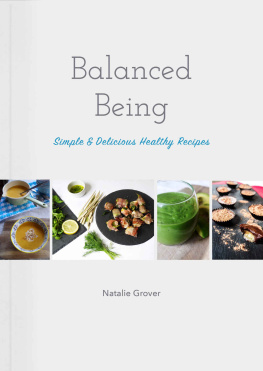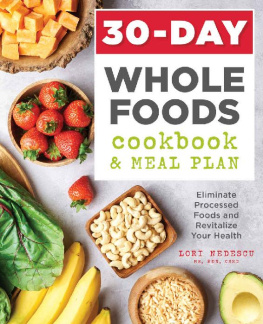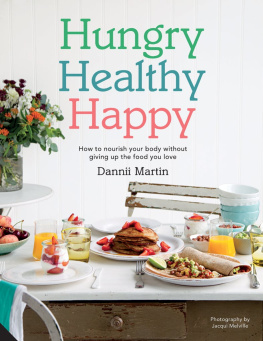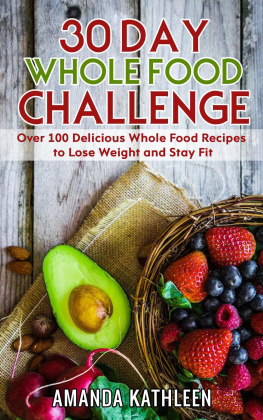

Balance your whole being at
www.balancedbeingonline.com
Instagram ~ Twitter ~ Facebook ~ Pinterest
CONTENTS

My Balanced Being Journey

My journey has been a long one. Growing up I was an avid dancer, singer and performer and well aware of the pressures to conform to a certain look. In my early teens I would often be cast aside for roles and shows where my already womanly figure didnt hit the mark. Being told youre not thin enough at a very early age was a knock to my confidence and the trigger to my previous 17 year body battle and eating disorder.
Years of highly restrictive/starvation and a binging/purging cycle left me feeling depressed, tired, drained and foggy. As my illness worsened, I took a step back from performing to focus on my own health. I began to study Anatomy and Physiology, started to research and re-educate myself on nutrition and developed a greater understanding of how food can play a major part in cravings and depression. It was pivotal in my decision to study diet and nutrition in more depth, not only out of fascination but for my own recovery.
Im now the proud founder of the Balanced Being Blog. Since launching in 2014 I am delighted I now have the opportunity to inspire other people and their own health journeys. Not only does the Balanced Being philosophy focus on health, but the importance of me time allowing you to treat your body and mind with the love and respect it deserves!
Natalie
www.balancedbeingonline.com
Instagram ~ Twitter ~ Facebook ~ Pinterest
There are a million cookbooks out there and a recent focus on a clean living lifestyle especially in the UK. So how is this book different? Quite simply Im a believer in a balanced diet, a healthy mind-set and learning to listen to your own body.
Not only do I feature dishes I myself love cooking, but the most popular recipes from my blog. All recipes are quick, simple, nourishing and most importantly excite the taste buds without starvation or deprivation. I want to dispel the myth that you need to spend hours in the kitchen or live on limp salads to be healthy. It really is very simple to create tasty, healthy meals just by using cleaner ingredients.
But, whats also special to me about this book is the additional wellness inspiration throughout that you can incorporate into your everyday life. Theres no point in you filling yourself with beautiful healthy foods, if youre not taking care of your overall wellness. The body AND mind to me are hugely intertwined and I believe that treating them both respectfully can lead to greater happiness, overall wellbeing and greater contentment.
Natalie is a qualified Nutritional Health Advisor, and a member of the International Association of Neuro-Linguistic Programming and Coaching. She is also a freelance writer, blogger and passionate cook.
We live in one of the most frantic existences ever known. With work, career, family commitments and the constant pressures from the media to conform to a specific look its easy to feel inadequate.
There are hundreds of health contradictions out there, from various governmental guidelines to the hip new diet that contradicts the previous weeks hip diet. Understandably it can get very confusing and frustrating!
So how should we be eating?
As a society we are obsessed by healthy eating and fitness. In the UK alone the diet industry (as of 2015) is worth 2 billion annually, and every year 55 per cent of Britons go on a diet.
But how should we be eating? Well in a perfect world we would eat perfectly 100% of the time, but its just not realistic for many reasons. Everyone is different and what works for one person, may not work for another. Ive seen this with the clients Ive coached on their personal health goals. Some people can tolerate certain foods and some people just cant. Our bodies can even reject a certain food out of the blue, especially if we indulge in too much of something.
Ive also spoken to many people whove tried vegan, raw, grain-free and a multitude of other diets, and have gained weight as a result or its just not agreed with them.
Im no scientist by any means, but from the work and research Ive carried out I realise it is crucial to listen to our bodies and really tune into what works and what doesnt for you. If a food doesnt agree with you then dont eat it. Alternatively if you love it then go ahead and indulge occasionally, but learn to know the consequences and effects on your body.
I also believe that making small, yet significant changes (especially if youve had a very unhealthy diet to date) can be just as effective to our health, rather than being very restrictive and then going onto binging on highly processed foods because you felt too deprived.
Sugar its not so sweet!
The one thing we should all be doing pretty swiftly is cutting down significantly on our sugar levels. For many years we were made to believe that it was fat making us fat. However, much research has been carried out that proves it is in fact sugar that causes the majority of weight gain.
Not only is sugar extremely addictive (scientists have discovered that sugar shares multiple features with addictive drugs like cocaine) but it can affect brain chemistry by triggering dopamine levels which causes the production of euphoric effects and drives the urge to consume more and more of it.
It can also affect the appetite hormone leptin. Leptin in high sugar meals causes a depletion of leptin in the body, which regulates our food intake and signals to the brain that the body has had enough food. As sugar secretes this hormone our brains assume we didnt have enough food and can lead to excess energy consumption and weight gain.
Excess sugar consumption can also lead to insulin resistance. Insulin regulates the hormone that helps the body use glucose (blood sugar) for energy. Insulin resistance means the body isnt using insulin properly so high levels of sugar remain in the bloodstream, which then sit in our cells and stores as fat. Various health issues and diseases are associated with excess sugar consumption including cancers, Polycystic Ovarian Syndrome (PCOS), hypertension, arthritis, tooth decay, MS, IBS, premature ageing and yeast infections.
How can I avoid it?
This is tricky as it is hidden EVERYWHERE. In processed, pre-packaged foods and alcohol. Its even hidden in savoury products such as pasta sauces, breads and cereals. The bottom line is sugar is very low in any beneficial nutrients; therefore we dont actually need it for our survival.
Although we should all be cooking from scratch and consuming wholefoods rather than packaged foods, I really do advise you to get used to checking your labels to see where hidden sugar may lie before purchasing. If its listed as the first few ingredients, than consume in moderation or make your own version using healthier alternatives.
What about natural sugars?
Although raw honey, maple syrup, agave, date syrups or brown rice syrup are considered healthier alternatives, they are still sugar and excess consumption can turn to fat. Even excess fresh or dried fruit with its fructose levels can make it difficult to lose weight or keep weight stable. Theres no reason why you cant make up your 5-a-day recommendations with more portions of vegetables than fruit.
Next page








